
| |
| home |
| projects |
| contact me |
| links |
AIR RAIDING!
pollution
To help you protect yourself and your loved ones from future air shortages, adverse air quality or unaffordable air supplies if and when air is privatised, we have developed a special and unique Air Raid Kit.
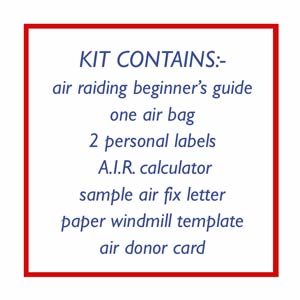
Details of how to air raid are given below. Prepare now and start raiding before it's too late!
1. What is air raiding?
Air raiding is the collection
and safeguarding of air for future personal use.
It's fun, it's thought-provoking and it may be essential for your future
survival - so join in our great air raid and start saving air
today!!!
2. Calculate your personal AIR
To ensure proper protection of
your future air supply, you must first calculate your personal lifetime
Air Inhalation Requirement (known as A.I.R.), using the A.I.R.
calculator. Do not be tempted to over-estimate your A.I.R. to ‘be
on the safe side’. Apart from the difficulties of storage, rapacious
air-raiding may leave others short of breath. There is enough air for
the whole world to breathe easily but only if we each collect only
enough for our own needs.
Please note that low A.I.R. types (eg unfit, short etc) may benefit from
lower pollutant inhalation due to lower overall air intake. Paradoxically
this may lead to greater life expectancy and therefore an increased A.I.R.
A.I.R. calculators are also available for pets (contact pet-air@flyintheface.com).
If you do save air for your pets, this could give you added protection
should your A.I.R. increase in the future, for instance due to moving
to higher ground for flood avoidance. Remember the traditional human
principle: ALWAYS put people first.
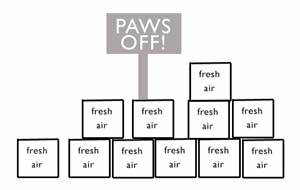
3.Source your A.C.U.s
Next you must choose your personal
A.C.U. (Air Collection Unit). All sorts of different types of containers
are suitable for air collection. Ideally use a container which would
otherwise be thrown away and always one that can be re-used or recycled
after use. Our favourite A.C.U.s are soft drinks bottles (billions
are thrown away every year so you will have no problem sourcing a large
enough quantity no matter how high your personal A.I.R. is). Alternatively,
why not try plastic carrier bags (750 billion of these are thrown away
worldwide each year) - but do be careful not place over head during
inhalation (see Step 9).
Calculate your required number of units by dividing your A.I.R. (see
Step 2) by the capacity of your chosen A.C.U. For instance, if your A.I.R.
is 100 million litres and your A.C.U. has a capacity of 2 litres, you
will need 50,000,000 units.
Ensure your chosen A.C.U.s are clean and free from particulate matter.
There is no need to sterilise, however, as the air you will be collecting
will not be sterile and, according to some scientific sources, germs may be
good for you and prevent you getting asthma.
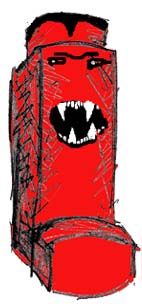 |
|
Vlad the Inhaler says, 'Asthma in developed countries and, especially, in the UK has escalated to epidemic levels over the last 50 years. 5.4 million people in the UK suffer from asthma - including 1 in 10 children - making us one of the ‘top’ countries in the world! So start breathing in those germs now...Unless, of course, those scientists have got it wrong and actually air pollution is the main cause....In which case, Air Fix as fast as you can!’ |
4.Choose where to raid (your airbase)
Take time to choose the optimum location.
Areas to avoid include:-
• major roads (in particular, intersections) and airports
• industrial areas
• urban areas
• major shipping routes & ports (shipping emissions are historically subject to very little control)
• high ground (not only is air thinner at high altitudes, mountains can also be subject to deposition of radioactivity, known as the Chenobyl effect)
• low-lying land (due to ground level ozone pollution)
• areas of human habitation - especially where people congregate to smoke (for example, outside office blocks. Remember you do not need to smoke yourself in order to enjoy the effects of passive smoking.)
• incinerators, landfill sites, bonfires
• former and current war-zones (remember chemical weapons are never just for today and will contaminate areas of deployment for decades to come)
• non-organic agriculture (especially during crop-spraying)
• rural and coastal areas (it is usually assumed that air in the country or by the sea is ‘clean’. UK rural and coastal areas, especially East Anglia in hot dry spells, actually suffer from high levels of low-lying ozone pollution, caused by a reaction between sunlight and industrial pollutants. In summer, these frequently exceed government and WHO guidelines.)
Useful tips:
- Always consider the prevailing wind direction and research thoroughly to ensure your chosen location is not down-wind of any areas to be avoided.
- Under no circumstances collect your air indoors as chemicals used in the home [otherwise known as household cleaners and air fresheners] and ‘off-gassing’ from DIY and other household products (for example, mdf, paints, fire retardants etc) are the source of many undesirable ingredients which must be avoided. In general, air quality in the home is inferior to that outside.
- Please note we do not recommend collection of air abroad as we now export much of our heavy industry to countries overseas, where we do not always insist on the same pollution control standards that we enjoy at home. As a result, air quality overseas is often inferior to ours and should be avoided.
- As a precaution, always choose as many air raid locations as possible.
5.Choose when to raid
Now you’ve found your ideal location(s), you will need to consider the optimum time to collect.
- Avoid school holidays/bank holidays (always more traffic pollution).
- Avoid periods of high pressure when low-lying ozone can be especially bad. This is particularly true in summer: when our weather seems perfect (hot dry cloud-free days), our rural air quality is at its worst. Ozone pollution triggers asthma symptoms, causes lung and heart diseases and, in some extreme cases can provoke premature death.
- Avoid damp days - higher water vapour content will increase the risk of condensation and mould in storage. Never collect in the rain or snow.
- Do not collect air when weather conditions are windy (force 4 or above) as this will increase the dust and particulate matter in the air.
- Avoid pollution ‘episodes’ or other times of increased pollution - to monitor local air quality, see the UK air quality archive.
- In order to minimise allergic response, do not collect on days when a high pollen count is expected. If collecting near people, avoid the cough and cold season.
- Also read news reports to be aware of any major flu outbreaks or similar.
6.Getting to your chosen location
- Under no circumstances travel by any pollution-emitting transport to your chosen air raid location as you will almost certainly contaminate your air supply through doing so. Acceptable means to travel include walking, skateboard, bicycle and horse (but beware methane gas). Take time to consider the best way for you personally.
- Obviously you need also to consider how you will carry your A.C.U.s. Do experiment and find out what works for you.
7.Raiding
- To raid, simply remove the cap or lid of your chosen ACU and waft gently above your head, stretching as high as you can. To avoid low-lying ozone when collecting in non-urban areas, a stepladder may be useful. Alternatively, try our high-heeled walking boots or aerial collecting device, illustrated below.
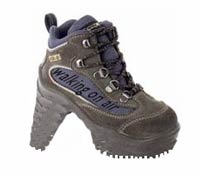 |
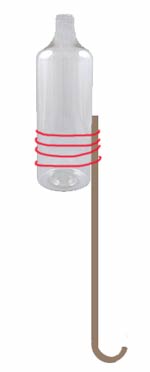 |
These are easy to make for yourself or e-mail high@flyintheface.com for
more details.
- Don’t worry if you accidentally capture wildlife* (such as insects or small birds) whilst air raiding. This is a sign of vibrant and healthy air quality - but do be sure to filter prior to inhalation.
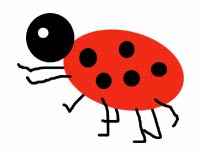 |
*unless mutant: if in doubt count legs/heads etc |
- If collecting at night, avoid the use of a torch or other light source so as to deter excessive moth collection.
- Use your senses! Observe your surroundings carefully for tell-tale signs. Lichen on trees and insect activity, for example, are good signs whereas blackened buildings and dead trees are a bad sign and indicative of acid rain and the presence of other pollutants.
- Be wary of capturing nano-particles. These are hard to detect and their longterm effects are not known. A nano-filterTM is currently under development - until then the precautionary principle should be adopted.
- Beware of the impact of festivals causing artificial highs.
- Air should be transparent - any visible colour, opacity or particles is a very bad sign. Discard and find a new airbase a long way away.
- Holes in the ozone are now affecting vast areas of our planet. Be sure to wear UV-protective clothing and headgear if collecting in these areas.
- In order to avoid tainting your collected air, do not use personal toiletries which might contain fragrance and be careful not to eat highly flavoured foods, such as onion and garlic, prior to raiding.
- Be sure to label all your A.C.U.s on completion of your raiding activity.
8.Storage of your A.C.U.s
- Ideally storage should be in a purpose-built air raid shelter, for example an air-dresser or air-port, but be sure to avoid all use of chemicals, using only pure uncontaminated materials in its construction. An existing building is unlikely to be suitable.
- Note: the air should be allowed to breathe in storage - if using plastic bottles or bags, do not seal caps or tops tightly to ensure there is no suffocation - and therefore stagnation - of your collected air.
- Dampness must be avoided at all times. Condensation and growth of moulds will render your air unusable.
Note: Conditions must also be good when transporting your air. Do not transport through or store in areas of poor air quality as deterioration of your collected air will inevitably result.
9. Usage of your A.C.U.s
- When ready to use your A.C.U.s, open carefully, avoiding unnecessary
air movement, and insert nose in pack (if using plastic drinks bottles
you may prefer to use two paper straws - or even to insert four straws
and share with a friend).
Important note: if using plastic bags as A.C.U.s, NEVER insert your whole head in the bag. - Breathe deeply and evenly. Live.
- Remember stay calm at all times - gasping will waste this precious resource and over-breathing may cause hyper-ventilation.
- To conserve your stored air, do not over-inhale. It is your protection against future air shortages, privatisation and air pollution episodes.
Why not enhance you air collection and inhalation experience by accompanying it with the following carefully selected tunes to help you breathe more easily:
Air on a g-string
Daydream breather
Lady in Raid
Airway to heaven
You air it well
Green green gas of home
Don’t breathe me this way
Breathing on a jetplane
Airless whisper
I'm gonna wash that man right outa my airHave we missed out your air raiding favourites? Send your inspirational ideas to tunes@flyintheface.com.
10. Dealing with an air shortage
If you find you have miscalculated your A.I.R. and need to conserve air, don’t worry - there are many things you can do to help:
- eat air-rich foods (eg. mousse, waffles, souffles, cappuccino and other frothy items)
- avoid air-wasting foods (eg. baked beans, artichokes)
- avoid air-consuming materials in the home (eg. ‘air’ trainers, bubble-wrap, air sprung mattresses)
- minimise your breath-taking activities: anything that raises the pulse or that causes deep breathing should be carefully monitored and reduced
- consider your own wind generation (template for paper windmill is included in the Air Raid kit). Note: spouting hot air is not air generation
As a last resort, you may wish to reduce your lung capacity by adopting a more indolent life-style and developing a shallow breathing habit.
11. Air Fix Activities
Why not help keep our air quality breathable with the following activities:-
- be your own air marshall - check websites, lobby the government and your M.P. (see a sample Air Fix letter) and encourage humans to avoid activities which will cause further deterioration of air quality.
- consider some major ‘Clean Air Acts’, such as running for election, giving up your car and holidaying near home.
- stand against privatisation and commodification of the essential ingredients of life.
Reclaim the air! Make it your business to find out about air quality and to ensure it is protected for future generations, wherever they may live.
12.Glossary of terms
a breath of fresh air - a perfect state of air (archaic)And finally if you need more inspiration...
air care - sustainable practices (for instance: organic growing, cycling etc)
air-dresser (also: air-port or air raid shelter) - special place to store air
air force - radical action to save our air
air-head - someone whose activities jeopardise everyone’s air quality
airlift - arm action required to undertake aerial air raiding (see Step 7)
air marshall - person who exerts air pressure
air pressure - lobbying (eg. of government) for better air management
airstyle - specific characteristics of a type of air, eg. sea breeze
airtight - putting profit above sustainability
air traffic control - insect management whilst air raiding (see Step 7)
breath-taking - polluting; likely to cause asthma attack
clean air act - changing your life to minimise your impact on air quality
Here’s some things people have said about air:
My air is grey, but not with years (Lord Byron)
Air today, gone tomorrow (old proverb, anon)
The air of the dog cures the bite (Italian proverb)
He that breatheth not shall be damned (Mark XVI.16)
There's many a man has more air than wit (William Shakespeare)
Grey air is a sign of age, not wisdom (Greek proverb)
If air I feel my spirits tire, I haul my sail, look up around (unattributed)
Falseness often lurks beneath fair air (Danish proverb)
Breathe only half of what you see and nothing that you hear (Dinah Craik)
Lawn as white as driven snow, cyprus black as air was crow (Shakespeare)
A man lives by breathing something (Thomas Carlyle)
An air divides what is false and true (Omar Khayyam)You might also enjoy Jane Air (Charlotte Bronte); A Comedy of Airers (Shakespeare)
References and useful websites:
uk-air.defra.gov.uk/ - UK air quality monitor and archive. Includes links to Air Quality in the UK 2010 report, as well as information regarding current and past pollution levels in your area.
www.euro.who.int/air - World Health Organisation information on air quality and health in Europe.
www.asthma.org.uk - homepage of the charity, Asthma UK, dedicated to improving the health and well-being of the 5.4 million people in the UK whose lives are affected by asthma.
www.eea.europa.eu - European Environment Agency website. Follow links to air pollution under Topics.
www.greenfacts.org - independent collation of information and reports about health and the environment, including air pollution.
www.parliament.uk - search ‘Environmental Audit Committee’ to find their latest reports on air quality.
About this guide:
This guide was originally included in an exhibition in 2007 as part of a larger project about air, inspired by my research into air quality in rural Suffolk. Both my partner and our son had begun to suffer from asthma when we moved to the coast and I discovered that ground level ozone pollution in East Anglia at times vastly exceeded World Health Organisation guidelines and that asthma rates in the UK had become amongst the highest in the world.
Things haven’t improved much since then: the Commons Environmental Audit Committee in 2011 concluded that the UK’s poor air quality was a bigger killer than passive smoking, road traffic accidents and obesity, leading to a possible 50,000 premature deaths every year. In London alone, air pollution has been linked to nearly one in five deaths a year. The UK’s pollution levels have been in breach of European law since the early 1990s but, instead of prioritising action to cut pollution on UK roads, the Govenment’s policy has been to try to water down EU air quality rules. In response, environmental journalist, John Vidal, described British air pollution (mostly caused by mass car use) in November 2011 as ‘state-sanctioned mass poisoning’.
An air raid booklet formed part of an ‘Air Raid Kit’ that I made and sold at my 2007 exhibition in support of Asthma UK and the Bhopal Medical Appeal. If you would like an air raid kit in return for a small charity donation, please contact me at fran@flyintheface.com.
Have you found this guide to air raiding useful?
We want to keep improving it so please air your views
and let me have your suggestions via airmail@flyintheface.com